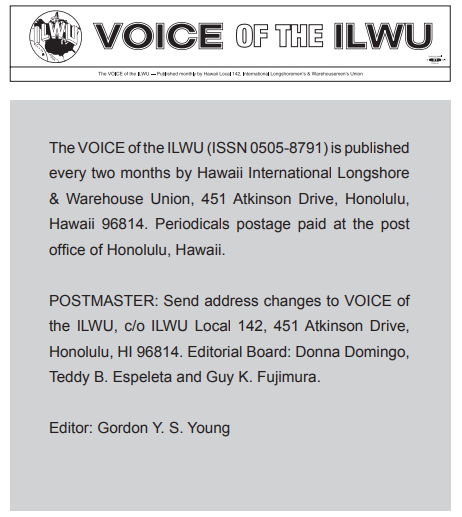credit, but more importantly, on the time frame of implementation. The Senate’s version calls for annual raises to $10.00 to be completed by 2017, whereas the House’s version calls for the raises to be completed by 2018. The governor said “that it should be done ASAP, not five years from now.”
The governor went on to state, “your members have the faith and trust of you fellow workers to represent them. We must stand together or we’ll be picked off one by one as anti-union interests have plenty of money to offset union gains. The only way to defeat them is through solidarity.”
Congresswoman Colleen Hanabusa addressed the Caucus via a recorded message. She delivered brief introductory remarks and extended well wishes. The congresswoman reiterated her continued support of the Jones Act and its importance to the United States.
Opponents to the Jones Act argue that the Act substantially increases the cost of goods imported into Hawaii and Alaska by limiting shipping competition.
The Jones Act is officially known as the Merchant Marine Act of 1920. The act regulates maritime commerce in U.S. waters and between U.S. ports. Generally speaking, the Jones Act prohibits any foreign built or foreign flagged vessel from engaging in port trade within the United States. All goods transported by water between U.S. ports must be carried on U.S. flagged ship, constructed in the United States, owned by U.S. citizens, and crewed by U.S. citizens.
The intention of the U.S. Congress is to ensure a strong United States maritime industry. Protecting the national security of the United States is probably one of the most important purposes of the Jones Act. If an exception is granted, a foreign flagged shipping company could refuse to move U.S. military cargo or any cargo. This could never happen under the Jones Act.
Next up was Mayor Kirk Caldwell. The mayor delivered brief introductory remarks and said, “Thank our fore bearers for what they have done so that we can enjoy what we have.”
He also expressed the importance of the Jones Act.
The mayor also remarked that the minimum wage should be raised as soon as possible because each time there is no implementation of a raise; that is a victory for the opponents.
The next business on the agenda was to have each Unit read the proposals submitted by the Unit to the body and to be recorded into the Caucus record. Each Unit will read their proposals into the Unit Committee meeting record when they meet later.
Several members of the Unit 4201 Executive Board came up front to read the Longshore Unit Proposals into the record. They included Caucus Chairman Elgin Calles, Brian Gonzaga (HSI), Caucus Secretary Drake Delaforce, Maurice Cecil (MHR), Alex Utoafili (HSI) and James Pestana (MHR). After fifteen minutes, Overall Unit 4201 Vice Chairman Dustin Dawson rose to ask if there was any way to expedite the proceedings. He was concerned that there would not be enough time left to discuss all the contract proposals in the Unit Committee meetings.
Longshore Division Director Nate Lum went to consult with Contract Administrator Michael Murata to see if there was a way to expedite the proceedings. During this time, the executive board continued to read the proposals into the record.
After some time, Lum returned and explained that the only suitable way other than reading the proposals into the Caucus record was to have each Unit’s Committee Chairman (i.e. Longshore, Wharf Clerks, Maintenance, CY/CFS, Wharf Clerical, Young Brothers, and Bulk Sugar) initial each page of their unit’s proposals and sign-off in the presence of the other committee chairs and contract administrator. These documents will then be deemed the official record.
Dawson made the motion and it was carried.
The Caucus recessed and broke into Unit Committee meetings to discuss and amend or accept additional proposals. All Unit Committees worked late into the night.
Friday, began as early as 8:00 a.m. for some Unit Committees to continue discussions. The main body reconvened at 9:30 a.m.
Honolulu City Council Chair Ernie Martin delivered brief introductory remarks and extended well wishes. Longshore Business Agent Tyrone Tahara reminded the body that Martin has been a strong supporter of the Honolulu Rail Project. Tahara reminded the body that the Rail Project has helped to increase work opportunity both on the docks and for other ILWU members. The increased work opportunity is due to increased off-loading of building supplies and the transporting of these building supplies from the docks by Longshore workers.
As the scheduled time of ending the Caucus drew near, Overall Unit 4201 Vice Chairman Dustin Dawson made a motion to extend the Caucus a couple of days because thorough discussions of the contract proposals were not completed. The motion was amended to allow Unit 4201 (Longshore) and Unit 4209 Young Brothers to meet two additional days to complete the discussions.
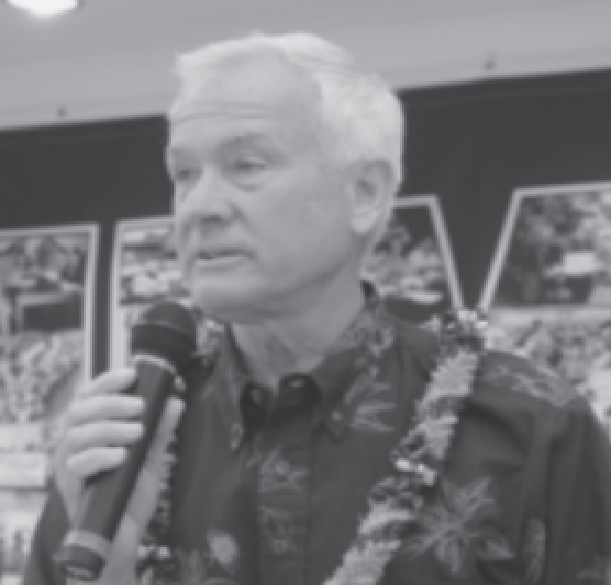
Mayor Kirk Caldwell expressing the importance of the Jones Act.
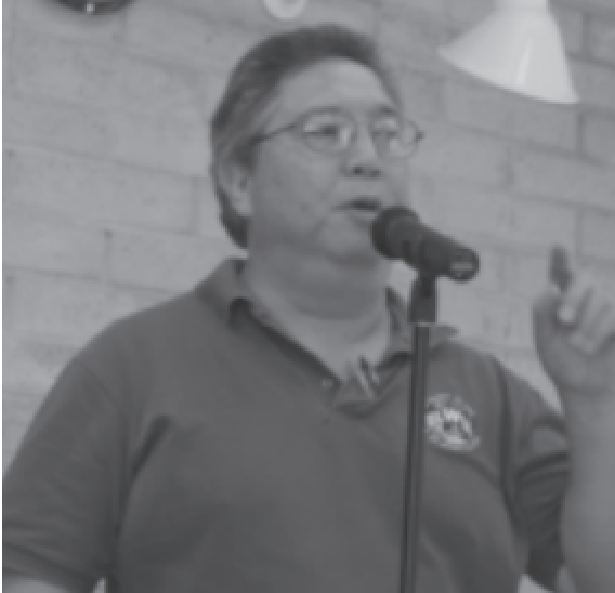
Longshore Division Business Agent Tyrone Tahara addressing the body.
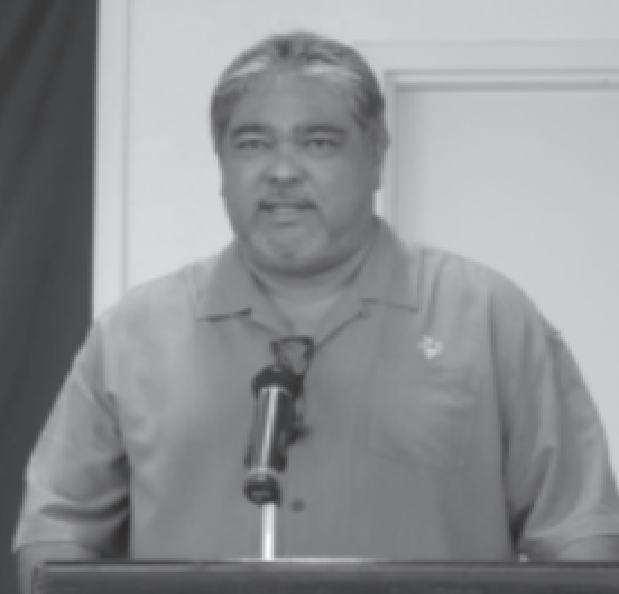
ILWU International Vice-President Hawaii Wes Furtado addressing the Caucus.
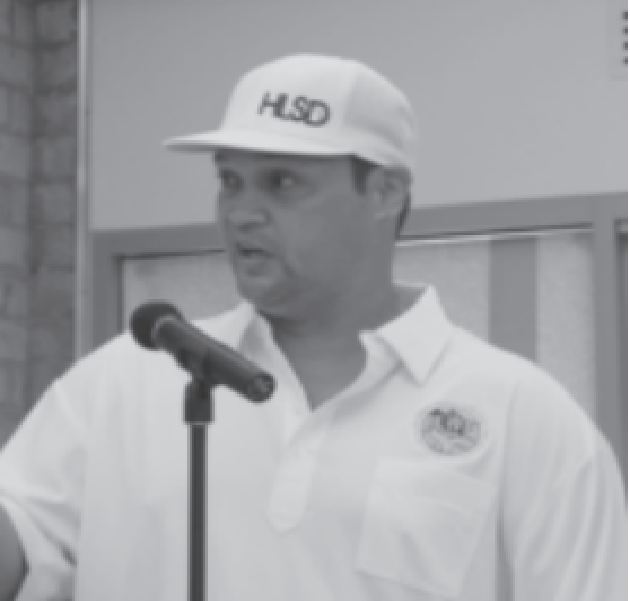
Overall Unit 4201 Vice Chairman Dustin Dawson questions the proceedings of the Caucus.
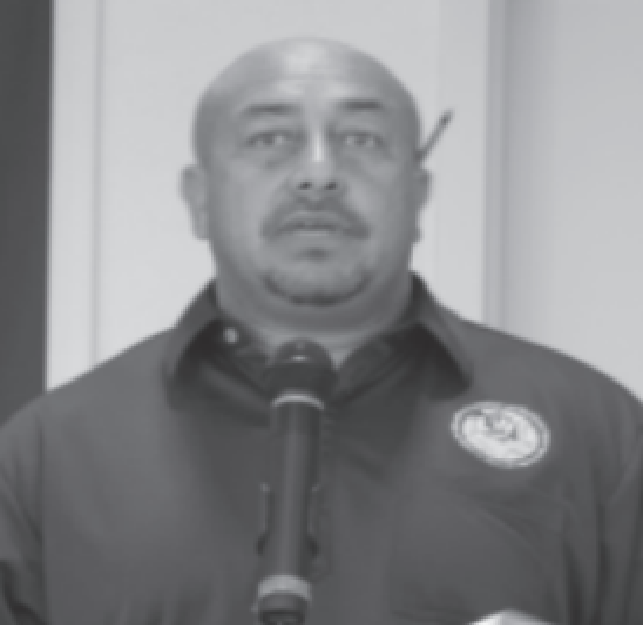
Unit 4201 Executive Board Member James Pestana (MHR) reporting on the West Coast Longshore Caucus held on February 24-March 7, 2014 in San Francisco.
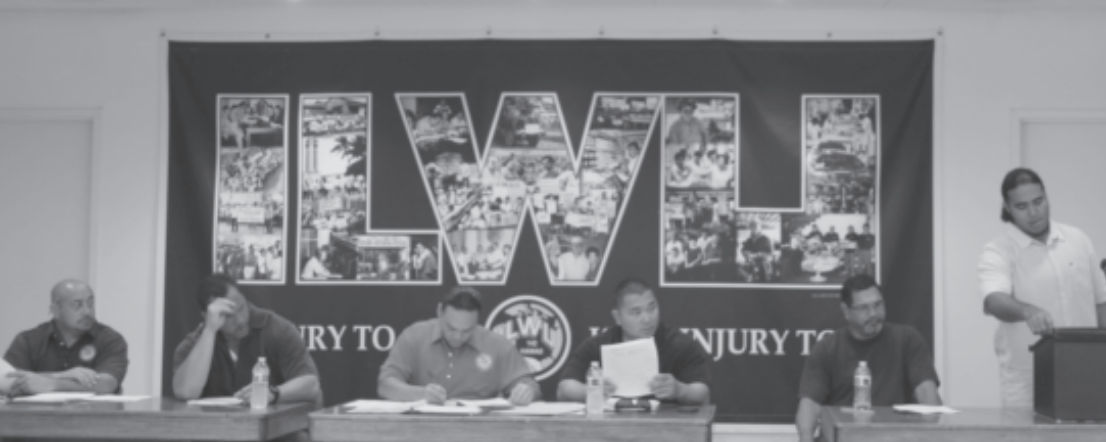
Unit 4201 Executive Board (l-r) James Pestana (MHR), Statewide Longshore Negotiations Chairman and Caucus Chairman Elgin Calles, Statewide Longshore Negotiations Secretary and Caucus Secretary Drake Delaforce, Brian Gonzaga (HSI), Maurice Cecil (MHR), watching Alex Utoafili (HSI) reading the Longshore Unit proposals into the record.
